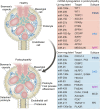Pathogenic Role of MicroRNA Dysregulation in Podocytopathies
- PMID: 35845986
- PMCID: PMC9277480
- DOI: 10.3389/fphys.2022.948094
Pathogenic Role of MicroRNA Dysregulation in Podocytopathies
Abstract
MicroRNAs (miRNAs) participate in the regulation of various important biological processes by regulating the expression of various genes at the post-transcriptional level. Podocytopathies are a series of renal diseases in which direct or indirect damage of podocytes results in proteinuria or nephrotic syndrome. Despite decades of research, the exact pathogenesis of podocytopathies remains incompletely understood and effective therapies are still lacking. An increasing body of evidence has revealed a critical role of miRNAs dysregulation in the onset and progression of podocytopathies. Moreover, several lines of research aimed at improving common podocytopathies diagnostic tools and avoiding invasive kidney biopsies have also identified circulating and urine miRNAs as possible diagnostic and prognostic biomarkers for podocytopathies. The present review mainly aims to provide an updated overview of the recent achievements in research on the potential applicability of miRNAs involved in renal disorders related to podocyte dysfunction by laying particular emphasis on focal segmental glomerulosclerosis (FSGS), minimal change disease (MCD), membranous nephropathy (MN), diabetic kidney disease (DKD) and IgA nephropathy (IgAN). Further investigation into these dysregulated miRNAs will not only generate novel insights into the mechanisms of podocytopathies, but also might yield novel strategies for the diagnosis and therapy of this disease.
Keywords: IgA nephropathy; diabetic kidney disease; focal segmental glomerulosclerosis; membranous nephropathy; microRNA; minimal change disease; podocytopathy; therapeutic target.
Copyright © 2022 Liu, Chen, Luo and Meng.
Conflict of interest statement
The authors declare that the research was conducted in the absence of any commercial or financial relationships that could be construed as a potential conflict of interest.
Figures


References
-
- Arif E., Solanki A. K., Srivastava P., Rahman B., Fitzgibbon W. R., Deng P., et al. (2019). Mitochondrial Biogenesis Induced by the β2-adrenergic Receptor Agonist Formoterol Accelerates Podocyte Recovery from Glomerular Injury. Kidney Int. 96 (3), 656–673. 10.1016/j.kint.2019.03.023 - DOI - PMC - PubMed
Publication types
LinkOut - more resources
Full Text Sources
Miscellaneous

